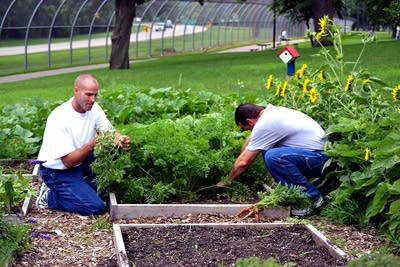Garden program grows at state prisons
Go Deeper.
Create an account or log in to save stories.
Like this?
Thanks for liking this story! We have added it to a list of your favorite stories.

A new law that takes effect Wednesday will turn more Minnesota prisoners into gardeners.
The law requires correctional facilities to start gardens if space and security allow. Inmates will grow fruits and vegetables, and donate what they don't eat to local food shelves. The gardens will be modeled after one that already exists at the Red Wing correctional facility.
Inside the Red Wing prison yard, inmates Cory Schilling and Jeremy Buschman walk through rows of vegetables that would be the envy of any gardener.
Schilling is serving a sentence for felony drunk driving, Buschman for attempted murder. They have both become obsessed with something they never imagined they would — seed catalogs and weeding. It isn't just the gardening they love. Buschman said it is the idea that most of their produce winds up in the hands of hungry Minnesotans.
Turn Up Your Support
MPR News helps you turn down the noise and build shared understanding. Turn up your support for this public resource and keep trusted journalism accessible to all.
"After all the stuff we've done wrong, for being here, it makes me feel better doing something to help other people." Buschman said.
Seven inmates volunteer to tend the garden, which this year has doubled in size. Schilling said the other prisoners respect them for it, but they do get razzed a bit.
"We are looked at as kind of the dorks, the geeks of the garden," Schilling said. "But that's the convict code. In prison you find that. It rolls off our back, and we keep producing fruit."
"We are looked at as kind of the dorks, the geeks of the garden."
In her nearby office, Red Wing warden Kathy Halvorson said gardens help with the problem of too much idle time, which can lead to fights or other trouble.
"It's really beneficial for a correctional facility to have offenders busy, to give them as many meaningful programs as we can give them," Halvorson said.
For all its benefits, the garden program isn't likely to expand to more than a few prisons, said Sarah Berg, a spokesperson for the Minnesota Department of Corrections.
"Security issues are definitely a concern," Berg said. "It's probably not something we're looking at in the higher custody or more maximum security facilities."
She says those high-security facilities carefully control how many people gather in one place. They also have rules about the availability of tools.
During the legislative session, the bill's sponsor said prison gardens save money on food costs and even reduce recidivism. But Berg doesn't expect the gardens will produce enough to cut costs. And, she said, while gardening teaches skills offenders can use when they're free, there is no research to show it cuts recidivism.
At the Red Wing Area Food Shelf, families fill up bags with vegetables from the prison. Last year the inmates donated almost 7,000 servings, a fraction of the food these charities give away each year. But Dee Bender, president of the food shelf board, said it is especially helpful because it's hard for food shelves to get anything other than canned food.
"I think those of us that have a portion of our income that we can go into the grocery store and buy whatever we want — we probably get to the produce first and we probably fill our cart with that," Bender said. "A lot of our clients don't have that luxury."
Back at the garden, Schilling and Buschman have some idea of what you'd find at a typical food shelf. They both used food shelves as kids. That's part of why Buschman is on his knees in the dirt.
"My mom went from being a recipient of it to someone who gives back. And now I'm going to be able to do that too," Buschman said.
Several states already have prison garden programs. In Wisconsin, 28 facilities participate. The largest prison harvested 75,000 pounds of produce last year. A spokesman for the Wisconsin Department of Corrections there says the program does exist at maximum security prisons in the state, and it does save the state money.
Dear reader,
Political debates with family or friends can get heated. But what if there was a way to handle them better?
You can learn how to have civil political conversations with our new e-book!
Download our free e-book, Talking Sense: Have Hard Political Conversations, Better, and learn how to talk without the tension.






